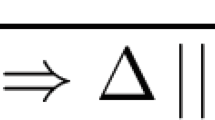Abstract
In this paper, we consider a constructive proof of the termination of the normal form (NF) algorithm for multivariate polynomials, as well as the related concept of admissible ordering <\(_{e}\) on monomials. In classical mathematics, the well-quasiorder property of relation <\(_{e}\) is derived from Dickson’s lemma, and this is sufficient to justify the termination of the NF algorithm. In provable programming based on constructive type theory (Coq and Agda), a somewhat stronger condition (in constructive mathematics) of the well-foundedness of the ordering (in its constructive version) is required. We propose a constructive proof of this theorem (T) for <\(_{e}\), which is based on a known method that we refer to here as the “pattern method.” This theorem on the well-foundedness of an arbitrary admissible ordering is also important in itself, independently of the NF algorithm. We are not aware of any other works on constructive proof of this theorem. However, it turns out that it follows, not very difficultly, from the results achieved by other researchers in 2003. We program this proof in the Agda language in the form of our library AdmissiblePPO-wellFounded of provable computational algebra programs. This development also uses the theorem to prove termination of the NF algorithm for polynomials. Thus, the library also contains a set of provable programs for polynomial algebra, which is significantly larger than that needed to prove Theorem T.
Similar content being viewed by others
REFERENCES
Meshveliani, S.D., On dependent types and intuitionism in programming mathematics, 2017. https://arxiv.org/find/all/1/all:+Mechveliani/0/1/0/all/0/1.
Meshveliani, S.D., AdmissiblePPO-wellFounded – A program in the Agda language for a constructive proof of Dickson’s lemma and for a theorem of wellfoundedness of any admissible ordering on monomials of polynomials, 2022. www.botik.ru/pub/local/Mechveliani/inAgda/admissiblePPO-wellFounded.zip.
Martin-Mateos, F.J., Alonso, J.A., Hidalgo, M.J., and Ruiz-Reina, J.L., A formal proof of Dickson’s lemma in ACL2, Logic Program., Artif. Intell., Reasoning, Vardi, M.Y. and Voronkov, A., Eds., 2003, pp. 49–58.
Agda Wiki, A proof assistant, A dependently typed functional programming language and its system. http://wiki.portal.chalmers.se/agda/pmwiki.php.
Norell, U., Dependently typed programming in Agda, Adv. Funct. Program., 2008, vol. 5832, pp. 230–266.
Buchberger, B., Gröbner Bases: An Algorithmic Method in Polynomial Ideal Theory, CAMP, 1983.
Coquand, Th. and Persson, H., Gröbner bases in type theory, 1998. https://www.researchgate.net/publication/221186683_Grobner_Bases_in_Type_Theory.
Théry, L., A machine-checked implementation of Buchberger’s algorithm, J. Autom. Reasoning, 2001, pp. 107–137.
Romanenko, S.A., Proof of Higman’s lemma (for two letters) formalized in Agda, 2017. https://pat.keldysh.ru/~roman/doc/talks/2017_Romanenko__Higman's_lemma_for_2_letters_in_Agda_ru__slides.pdf. Agda program for the proof (in the Berghofer folder): https://github.com/sergei-romanenko/agda-Higman-lemma.
Robbiano, L., Term orderings on the polynomial ring, Proc. Eur. Conf. Comput. Algebra (EUROCAL), Linz, 1986, pp. 513–517.
Curry, H.B. and Feys, R., Combinatory Logic, 1958, vol. 1.
Howard, W.A., The formulae-as-types notion of construction, To H.B. Curry: Essays on Combinatory Logic, Lambda Calculus and Formalism, Boston: Academic Press, 1980, pp. 479–490.
Markov, A.A., On constructive mathematics, Problems of constructive direction in mathematics, Part 2: Constructive mathematical analysis, Tr. Mat. Inst. im. V.A. Steklova (Proc. Steklov Inst. Math.), Izd. Akad. Nauk SSSR, Moscow, 1962, pp. 8–14.
Per Martin-Löf, Intuitionistic Type Theory, Bibliopolis, 1984.
Stricland, N.P., Euclid’s theorem: An annotated proof in Agda that there are infinitely many primes. https://nextjournal.com/agda/euclid-theorem.
Vytiniotis, D., Coquand, Th., and Wahlstedt, D., Stop when you are almost-full: Adventures in constructive termination, Proc. Conf. Interactive Theorem Proving (ITP), 2012, pp. 250–265.
ACKNOWLEDGMENTS
• The author is grateful to Antonina N. Nepejvoda and Andrei P. Nemytykh for their useful remarks.
• The author thanks the participants of the Computer Algebra seminar lead by S. A. Abramov (Faculty of Computational Mathematics and Cybernetics of the Moscow State University) for the discussion on the subject of this paper.
Funding
This work was supported by the Ministry of Science and Higher Education of the Russian Federation, project no. 122012700089-0.
Author information
Authors and Affiliations
Corresponding author
Ethics declarations
The author declares that he has no conflicts of interest.
Additional information
Translated by Yu. Kornienko
Rights and permissions
About this article
Cite this article
Meshveliani, S.D. Admissible Ordering on Monomials is Well-Founded: A Constructive Proof. Program Comput Soft 49, 199–214 (2023). https://doi.org/10.1134/S0361768823040102
Received:
Revised:
Accepted:
Published:
Issue Date:
DOI: https://doi.org/10.1134/S0361768823040102




